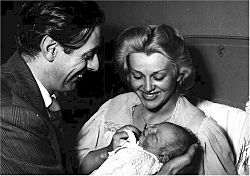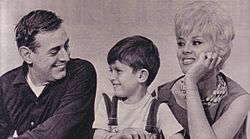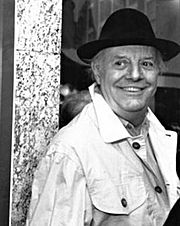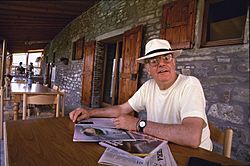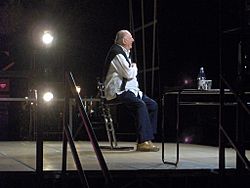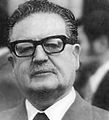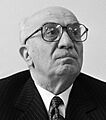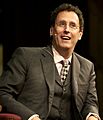Dario Fo facts for kids
Quick facts for kids
Dario Fo
|
|
|---|---|
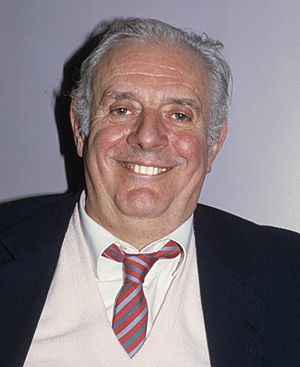
Dario Fo in November 1984
|
|
| Born | Dario Luigi Angelo Fo 24 March 1926 Leggiuno, Sangiano, Varese, Italy |
| Died | 13 October 2016 (aged 90) Milan, Italy |
| Occupation |
|
| Period | Post-war era |
| Genre | Drama |
| Subject |
|
| Notable works |
|
| Notable awards | Nobel Prize in Literature 1997 |
| Spouse |
Franca Rame
(m. 1954; died 2013) |
| Children | Jacopo Fo |
| Signature | |
 |
|
Dario Luigi Angelo Fo (born March 24, 1926 – died October 13, 2016) was a famous Italian writer of plays, an actor, and a theater director. He also designed stage sets, wrote songs, and was involved in politics, supporting left-wing ideas in Italy. In 1997, he won the Nobel Prize in Literature, which is a very important award. Many people considered him one of the most performed playwrights in the world during his time.
His plays have been translated into 30 languages and performed in many countries, from Argentina to the United States. One of his most famous solo shows, Mistero Buffo, was performed for 30 years across Europe, Canada, and Latin America. It is known as one of the most popular and talked-about shows in European theater after World War II. Another play, Can't Pay? Won't Pay!, became so well-known that its English title is now a common phrase. This play is seen as capturing the feelings and actions of working-class people everywhere.
When he received the Nobel Prize in Literature, it showed that he was recognized internationally as a major figure in 20th-century theater. The Swedish Academy, which gives out the Nobel Prizes, praised Fo for being like the jesters of the Middle Ages. They said he used his art to criticize powerful people and support those who were struggling. Dario Fo also owned and ran his own theater company. He was an atheist, meaning he did not believe in God.
Contents
Early Life and Learning
Dario Fo was the oldest child in his family. He was born in Sangiano, a town in Italy near Lake Maggiore. His younger brother, Fulvio, became a theater manager, and his younger sister, Bianca, became a writer. His mother, Pina Rota Fo, came from a farming family and wrote a book about her memories of the area.
His father, Felice, worked for the Italian state railway as a station master, so the family often moved to different towns along the Swiss border. Felice was also a socialist, which meant he believed in a society where everyone is equal and resources are shared. He also acted in plays as a hobby. Dario learned how to tell stories from his grandfather and from local fishers and glassblowers.
In 1942, when he was 16, Fo moved to Milan to study art. However, World War II changed his plans. He was drafted into the army by the government at the time. Fo later explained that his family was secretly helping people who were against the government. He helped his father smuggle refugees and Allied soldiers to Switzerland by disguising them as local farmers. His father also helped Jewish scientists escape to Switzerland.
As the war ended, Fo tried to leave the army. He deserted twice and spent time hiding in the countryside. After the war, he went back to art school and also studied architecture. He started writing a thesis on Roman architecture but soon realized he didn't like the kind of simple, uncreative work architects were doing. He left his studies before finishing.
He felt very stressed and needed a break. A doctor told him to do things that made him happy. So, he started painting and got involved in "small theaters" where he performed his own improvised stories. He was inspired by many famous artists and writers like Bertolt Brecht and Molière.
Career in Theater
Starting Out in the 1950s
In 1950, Dario Fo began working with Franco Parenti on a radio show. Fo told stories from his childhood, which Parenti found very funny and original. This led them to create a new kind of show that was more involved and took a stand on issues.
Soon, the Italian national radio station, RAI, invited Fo to perform his own comedy series called Poer nano (Poor thing). He created 18 funny stories based on old tales and even Shakespeare, but with funny twists. The authorities found the show too controversial and canceled it. However, Fo then performed it on stage, which allowed him to add more actions and gestures.
In 1953, Fo, Parenti, and another actor, Giustino Durano, formed their own theater company. They created a show called Il dito nell'occhio (A finger in the eye), which was a funny look at world history. It was very popular and toured after many performances. This was also when Fo started writing songs, often with music by Fiorenzo Carpi. Their first song, "The moon is a lightbulb," is still one of Fo's most famous.
Fo met Franca Rame, who came from a family of theater performers, while they were working on a show. They got married on June 24, 1954, and had a son, Jacopo, in 1955, who also became a writer.
After their first company ended due to money problems, Fo and his family moved to Rome. Fo hoped to work as a screenwriter for movies. He worked on several films, and in 1956, he co-wrote and acted in The Screwball, a comedy film.
In 1958, the family returned to Milan. Fo and Rame then started their own theater company, Compagnia Fo-Rame. Fo wrote, acted, directed, and designed everything for their plays, while Rame managed the business side. Their play Archangels Don't Play Pinball brought them national and international fame. It was the first of Fo's plays to be performed outside Italy.
Challenges in the 1960s
In 1962, Fo wrote and directed a popular TV show called Canzonissima for RAI. He wanted to show Italians a different kind of TV, one that was more like traditional theater and less like "junk TV." The show featured funny songs and sketches about the lives of working people. However, it was often censored. For example, a sketch about a woman falling into a meat factory and becoming mincemeat caused complaints from meat producers.
Despite its popularity, the show's eighth episode led to a big problem. It talked about the dangerous conditions for construction workers. The producers refused to broadcast it, fearing it would upset workers' unions. Fo and Rame left the show in protest. This censorship caused a national outcry and led to Fo and Rame being banned from Italian television for 14 years.
Fo returned to the theater with Isabella, Three Sailing Ships and a Con Man, which tried to show a different, less heroic side of Christopher Columbus. Fo said he wanted to criticize intellectuals who quickly embraced power. He received threatening letters and was even attacked by groups who threw trash at him.
Throw the Lady Out was the last play Fo performed in the official Italian theater system. It included references to the Vietnam War and the assassination of John F. Kennedy. Because of this, the U.S. government later often denied Fo entry into the country.
Inspired by student protests in France in May 1968, Fo and Rame left the official state theater. They created a new theater group called Associazione Nuova Scena, which worked outside the government system. They asked a left-wing political party for help and used community centers and workers' clubs for their performances. Their plays, like Grand Pantomime with Flags and Small and Middle-sized Puppets and Mistero Buffo, often used masks and criticized powerful groups. Even though Fo was never a member of the Communist Party, his plays sometimes criticized their methods, leading to disagreements.
New Groups and Fame in the 1970s
In 1970, Fo and Rame started their third theater group, Collettivo Teatrale "La Comune". They turned an old workshop in Milan into a community center. There, they created plays based on current events, often using improvisation. One play, I'd Rather Die Tonight If I Had To Think It Had All Been In Vain, attracted thousands of people.
Next came Accidental Death of an Anarchist, which became Fo's most famous play internationally. He wrote it after a bomb attack in Milan in 1969. This play toured Italy and was followed by Can't Pay? Won't Pay!, a farce about people taking what they needed from markets during a tough economic time and paying what they could afford. This play became very well-known and was performed in 35 countries.
In 1975, Fo was nominated for the Nobel Prize for the first time. He found the idea funny, saying it would be like acting in one of his own plays, given his history of criticizing authority.
After 14 years, Fo returned to television in 1977. He was on the second channel, Rai 2, which was less conservative. That year, Franca Rame also performed a series of five monologues called All House, Bed and Church, which were very popular.
Global Recognition and Challenges in the 1980s
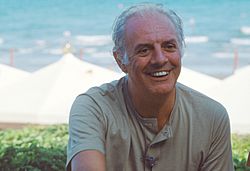
In 1980, the United States stopped Fo and Rame from performing at a festival there. Many famous artists protested this decision. In 1981, Fo and Rame performed Trumpets and Raspberries, which was seen by 50,000 people in Milan and later produced in 15 other countries.
In September 1983, the U.S. authorities again refused to let Fo and Rame enter the country. They accused them of supporting terrorist groups, which Fo found bewildering since Italian authorities had never made such charges. Fo held a press conference to explain how insulted he and his wife felt.
In 1985, Fo created Hellequin, Harlekin, Arlecchino, based on the famous Harlequin character. In 1986, he wrote Kidnapping Francesca, about a banker who fakes her own kidnapping. Fo also became a Professor of Drama at the University of Rome, where he taught about Harlequin and commedia dell'arte, a type of Italian comedy.
In 1987, a performance of The First Miracle of the Infant Jesus on Italian television led to more accusations of blasphemy from the Vatican. In 1988, Fo acted in a film for the first time since 1958.
In 1989, to show support for those affected by events in China, Fo updated an old play and wrote two new monologues. He also wrote The Wanted Man, a play about the mafia that was never performed, and The Pope and the Witch, which was praised for its humor and became the most-watched play in Italy that season.
New Themes in the 1990s
In 1990, Fo wrote Hush! We're Falling!, which addressed topics like AIDS, the Gulf War, and genetic experiments. In 1992, he wrote Johan Padan and the Discovery of the Americas as his response to the 500th anniversary of Christopher Columbus's first voyage. The play tells the story of a Venetian fugitive who escapes the Spanish Inquisition by joining Columbus's voyage. He ends up shipwrecked and rescued by Native Americans.
In 1993, Fo planned a play about Angelo Beolco, an old Italian playwright. However, the project was stopped by a government letter, citing a law against public and private companies working together.
Fo and Rame also worked on Seventh Commandment: Steal a Bit Less No. 2, which was inspired by the corruption scandals happening in Italy in the 1990s. They later performed Mummy! The Sans-culottes!, which was set in the 18th century but also referred to these scandals.
On July 17, 1995, Fo had a stroke but quickly recovered. In 1996, he wrote Leonardo: The Flight, the Count and the Amours.
21st Century and Final Years
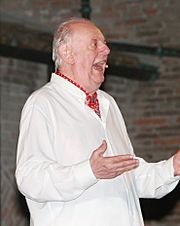
In 2001, Fo became a Satrap of the Collège de ‘Pataphysique, a group that studies imaginary solutions. In 2004, a politician sued Fo over references to him in his latest play, The Two-Headed Anomaly. Fo was disgusted, saying he had been doing satire for 40 years. The play also made fun of the prime minister at the time, Silvio Berlusconi. Fo said he received threats from politicians if he performed it.
In 2005, Fo announced he would run for Mayor of Milan the following year. He wanted to fight against the current mayor. He campaigned on stage, as he was often kept off Italian television. He opposed plans to demolish parts of the city center. He did not win the election but came in second.
Throughout the early 21st century, until his death in 2016, Fo remained active in political, social, and cultural issues. He questioned the official accounts of the September 11 attacks in a film. In 2008, he signed a letter asking the state to protect a writer whose life was threatened for exposing criminal activities. Before the 2013 Italian election, Fo said his satire was targeting banks and big business owners who control the media and try to make people accept their situations.
Death
Dario Fo passed away on October 13, 2016, at the age of 90. He died due to a serious breathing illness.
Filmography
| Year | Title | Role | Notes |
|---|---|---|---|
| 1954 | Red and Black | Writer | |
| 1955 | Elementary School | Typographer | |
| 1956 | The Screwball | Achille | |
| 1957 | Souvenir of Italy | Carlino | Uncredited |
| 1957 | Rascel-Fifì | Pupo - the blond | |
| 1958 | Born in March | Singer in tavern | Uncredited |
| 1958 | Sunday is Always Sunday | The Silk Stockings Salesman | |
| 1963 | Summer Follies | Gangster | |
| 1989 | Music for Old Animals | Lucio Lucertola | |
| 1996 | The Blue Arrow | Scarafoni | Voice |
| 2002 | Johan Padan and the Discovery of the Americas | Johan Padan (old) | Voice |
| 2016 | Sweet Democracy | (final film role) | |
| 2016 | The Fantastic Story of Marc Chagall | Himself | |
| 2017 | Dario Fo and Franca Rame, Our Story | Himself |
Awards and Honors
- 1981: Sonning Prize from Copenhagen University
- 1985: Premio Eduardo Award
- 1986: Obie Award in New York (with Franca Rame)
- 1987: Agro Dolce Prize
- 1997: Nobel Prize in Literature
- 2001: Honorary doctorate from the Vrije Universiteit Brussel, Belgium
- 2002: Order of Saint Agatha by the Republic of San Marino
Images for kids
See also
 In Spanish: Dario Fo para niños
In Spanish: Dario Fo para niños
 | Toni Morrison |
 | Barack Obama |
 | Martin Luther King Jr. |
 | Ralph Bunche |


